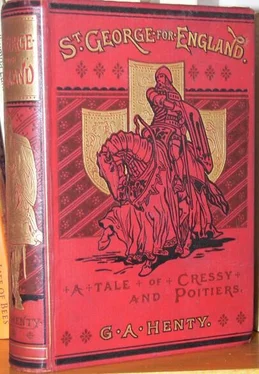G. Henty - St. George for England - A Tale of Cressy and Poitiers
Здесь есть возможность читать онлайн «G. Henty - St. George for England - A Tale of Cressy and Poitiers» весь текст электронной книги совершенно бесплатно (целиком полную версию без сокращений). В некоторых случаях можно слушать аудио, скачать через торрент в формате fb2 и присутствует краткое содержание. Жанр: Старинная литература, на английском языке. Описание произведения, (предисловие) а так же отзывы посетителей доступны на портале библиотеки ЛибКат.
- Название:St. George for England: A Tale of Cressy and Poitiers
- Автор:
- Жанр:
- Год:неизвестен
- ISBN:нет данных
- Рейтинг книги:3 / 5. Голосов: 1
-
Избранное:Добавить в избранное
- Отзывы:
-
Ваша оценка:
- 60
- 1
- 2
- 3
- 4
- 5
St. George for England: A Tale of Cressy and Poitiers: краткое содержание, описание и аннотация
Предлагаем к чтению аннотацию, описание, краткое содержание или предисловие (зависит от того, что написал сам автор книги «St. George for England: A Tale of Cressy and Poitiers»). Если вы не нашли необходимую информацию о книге — напишите в комментариях, мы постараемся отыскать её.
St. George for England: A Tale of Cressy and Poitiers — читать онлайн бесплатно полную книгу (весь текст) целиком
Ниже представлен текст книги, разбитый по страницам. Система сохранения места последней прочитанной страницы, позволяет с удобством читать онлайн бесплатно книгу «St. George for England: A Tale of Cressy and Poitiers», без необходимости каждый раз заново искать на чём Вы остановились. Поставьте закладку, и сможете в любой момент перейти на страницу, на которой закончили чтение.
Интервал:
Закладка:
Walter was in the highest spirits. A brilliant career was open to him under the most favorable circumstances; he had already distinguished himself, and had gained the attention of the highest personages in the realm, his immediate lord was one of the bravest and most chivalrous knights in Europe, and he had to sustain and encourage him the hopes that Lady Vernon had given him of regaining some day the patrimony of his father. It was a satisfaction to him that he was as well born as those who surrounded him, and his purse was as well lined as any in the company. Although he had spent the largess which had been bestowed upon him at the tournament in procuring clothes fitted for his rank, he was yet abundantly supplied with money, for both Geoffrey Ward and Giles Fletcher, having no children of their own and being both well-to-do men, had insisted upon his accepting a sum which would enable him to make a good appearance with the best.
A large number of squires followed the banner of Sir Walter Manny. The records of the time show that the barons were generally accompanied in the field by almost as many squires as men-at-arms. The former were men of good family, sons of knights and nobles, aspirants for the honor of knighthood, and sons of the smaller gentry. Many were there from pure love of a life of excitement and adventure, others in fulfillment of the feudal tenure by which all land was then held, each noble and landowner being obliged to furnish so many knights, squires, men-at-arms, and archers, in accordance with the size of his holding. The squires fought in the field in the front rank of the men-at-arms, save those who, like Walter, were attached to the person of their leader, and who in the field fought behind him or bore his orders to the companies under his banner.
In the field all drew pay, and it may be interesting in the present day to know what were the rates for which our forefathers risked their lives. They were as follows: Each horse archer received 6 deniers, each squire 12 deniers or 1 sol, each knight 2 sols, each knight banneret 4 sols; 20 sols went to the pound, and although the exact value of money in those days relative to that which it bears at the present time is doubtful, it may be placed at twelve times the present value. Therefore each horse archer received an equivalent to 6 s. a day, each squire 12 s. , each knight 24 s. , and each knight banneret 48 s. per day.
Upon their arrival at the Orwell, where many troops from other parts had been gathered, the expedition at once embarked on board the numerous ships which had been collected. As that in which Sir Walter sailed also carried several of his knights there was not room for all his young esquires, and Walter and the three other juniors were told off into another ship. She was a smaller vessel than most of those which composed the expedition, and only carried twelve men-at-arms and as many archers, together with the four young squires, and a knight, Sir John Powis, who was in command of the whole.
"Your craft is but a small one," the knight said to the captain.
"She is small, but she is fast," the latter answered. "She would sail round and round the best part of the fleet. I had her built according to my own fancy. Small though she be, I warrant you she will be one of the first to arrive at Hennebon, and the sooner the better say I, since I am but paid by the trip, and would fain be back again at my regular work. It pays better carrying merchants' goods between London and Holland than taking his majesty's troops over to France."
"Your speed will not be of much avail," Sir John Powis said, "seeing that the fleet will keep together."
"Yes, I know that is the order," the captain answered; "but accidents happen sometimes, you know"—and his eye twinkled. "Vessels get separated from fleets. If they happen to be slow ones, so much the worse for those on board; if they happen to be fast ones, so much the better, seeing that those they carry will arrive long before their comrades, and may be enabled to gain credit and renown while the others are whistling for a wind in mid-ocean. However, we shall see."
The next morning the fleet sailed from the Orwell. It contained 620 men-at-arms, among whom were many of the noblest and bravest of the country, and 6,000 picked archers in the pay of the king. The whole were commanded by Sir Walter. The scene was a very gay one. The banners of the nobles and knights floated from the lofty poops, and the sun shone on bright armor and steel weapons. Walter, who had never seen the sea before, was delighted. The wind was fair, and the vessels glided smoothly along over the sea. At evening the knight and his four young companions gathered in the little cabin, for it was in the first week in March, and the night was cold.
"Will you please tell me, Sir John," Walter said to the knight, "the merits of this quarrel in which we are going to fight? I know that we are going in aid of the Countess of Montford; but why she is in a sore strait I know not."
"The matter is a mixed one, Walter, and it requires a herald to tell you all the subtleties of it. John III., Duke of Brittany, was present with his liege lord, Philip of Valois, in the last war with England, on the border of the Low Country. When the English retired from before Tournay Philip dismissed his nobles. The Duke of Burgundy was taken ill, and died at Caen, in Normandy, on the 30th of April, 1341. Arthur II., his father, had been twice married. By his first wife he had three sons, John, Guy, and Peter. John and Peter left no issue. Guy, who is also dead, left a daughter, Joan. By his second wife, Jolande de Dieux, Duke Arthur had one son, John, Count of Montford. Thus it happened that when Duke John died his half-brother, the Count of Montford, and Joan, daughter of his second brother Guy, were all that survived of the family. These were the rival claimants for the vacant dukedom. In England we have but one law of succession, which rules through the whole land. In France it is different. There the law of succession depends entirely upon the custom of the county, dukedom, or lordship, which is further affected both by the form of grant by which the territory was conveyed to its first feudal possessors and by the mode in which the province had been acquired by the kings of France. This is important, as upon these circumstances alone it depended whether the son or the granddaughter of Arthur II. should inherit the dukedom.
"Joan claimed the duchy as the daughter of the elder brother. The Salic law of France, which barred females from the right of succession, and in virtue of which Philip of Valois succeeded to the throne instead of King Edward, certainly did not obtain in Brittany. Duke John regarded Joan as his heiress, and married her to Charles of Blois, nephew of the King of France, thus strengthening her in her position; and he also induced the provincial parliament of Brittany to acknowledge her husband as his successor in the dukedom. Altogether it would seem that right is upon Joan's side; but, on the other hand, the Count of Montford is the son of Jolande, a great heiress in Brittany. He is an active and energetic noble. The Bretons love not too close a connection with France, and assuredly prefer to be ruled by a duke whom they regard as one of themselves rather than by Charles of Blois, nephew of the French king. Directly Duke John was dead the Count of Montford claimed the inheritance. Assuming the title of duke he rode to Nantes, where the citizens did him homage, and then proceeded to Limoges with a large train of men-at-arms, and there took possession of the immense treasures which the late duke had accumulated in the course of a long and tranquil reign. With these sinews of war at his command he returned to Nantes, where he had left his wife the countess, who was a sister of the Count of Flanders. He immediately invited the nobility of Brittany to a grand banquet, but only one knight of any renown presented himself at the feast, the rest all holding aloof. With the wealth of which he had possessed himself he levied large forces and took the field. He first marched against Brest, where the garrison, commanded by Walter de Clisson, refused to acknowledge him. After three days' hard fighting the place was taken. Rennes was next besieged, and presently surrendered. Other towns fell into his hands, and so far as Brittany was concerned all opposition, except in one or two fortresses, ceased. In the mean while Charles of Blois sought assistance from his uncle the King of France; the Count de Montford, therefore, crossed to England and besought the aid of King Edward, and did homage to him as King of France. Edward, on his part, promised to assist him. The fact that Philip was sure to espouse the opposite side was in itself sufficient to decide him; besides which, the dukes of Brittany have always been in a special way connected with England and bear the English title of Earl of Richmond.
Читать дальшеИнтервал:
Закладка:
Похожие книги на «St. George for England: A Tale of Cressy and Poitiers»
Представляем Вашему вниманию похожие книги на «St. George for England: A Tale of Cressy and Poitiers» списком для выбора. Мы отобрали схожую по названию и смыслу литературу в надежде предоставить читателям больше вариантов отыскать новые, интересные, ещё непрочитанные произведения.
Обсуждение, отзывы о книге «St. George for England: A Tale of Cressy and Poitiers» и просто собственные мнения читателей. Оставьте ваши комментарии, напишите, что Вы думаете о произведении, его смысле или главных героях. Укажите что конкретно понравилось, а что нет, и почему Вы так считаете.












